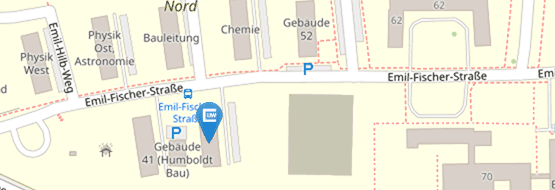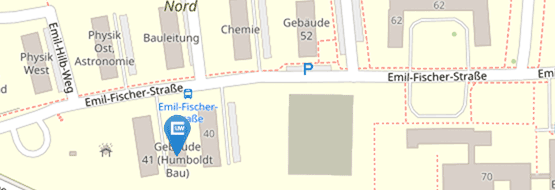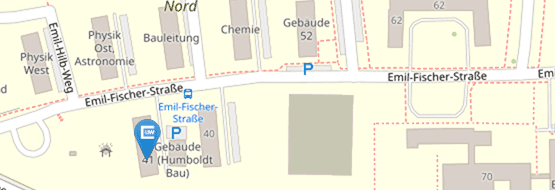Research Projects
Project management: Prof. Dr. Sergey Dashkovskiy
sergey.dashkovskiy@mathematik.uni-wuerzburg.de
Project period: 2018-2019
Funding institut: ERASMUS + National Agency "Higher Education", DAAD - Deutscher Akademischer Austauschdienst
Funding sum: 66.000,00 €
Funding code: 2018-1-DE01-KA107-003928
Project partner:
Chair for Computer science I, Universität Würzburg, Prof. Dr. Alexander Wolff
Chair for Computer science VIII, Universität Würzburg, Prof. Dr.-Ing. Sergio Montenegro
Odessa I. I. Mechnikov National University, Odessa, Ukraine
Kyiv Taras Shevchenko University, Ukraine, Prof. Dr. Oleksiy Kapustyan
Project descritption
Dynamic systems: How attractors react to perturbations
"Stability and robustness of attractors of nonlinear infinite-dimensional systems under perturbations": In this project, Professor Sergey Dashkovskiy and his postdoc Dr. Jochen Schmid are working with the group of Professor Oleksiy Kapustyan from Taras Shevchenko University in Kiev. The DFG is funding the postdoctoral position in Würzburg for two years.
The term "attractor" comes from the theory of dynamic systems. It describes a value towards which a dynamic system moves over time - in other words, a set of variables approaches the attractor and then remains in its vicinity. Attractors provide information about the long-term behaviour of a system. However, certain disturbances can destroy an attractor or change its properties. Such effects will be analysed qualitatively and quantitatively in the new research project.
The project also investigates the effects of coupling two or more dynamic systems with attractors on the existence and properties of the attractor of the overall system. Professor Kapustyan's working group specialises in the attractor theory of non-linear systems, while Professor Dashkovskiy's group specialises in perturbed and coupled systems. Both areas of expertise complement each other perfectly in the project.
Project management: Prof. Dr. Sergey Dashkovskiy
sergey.dashkovskiy@mathematik.uni-wuerzburg.de
Assistant: Dr. Joachim Schmid
Project period: 2016 - 2019
Funding institution: DFG
Funding sum: 168.800,00 €
Funding code: DA 767/7-1
Prof. Dr. Birgit Jacob, University of Wuppertal
Prof. Dr. Fabian Wirth, University of Passau
Project description
Robust stability and stabilization of control systems are fundamental and challenging problems in control theory and its applications. One of the milestones of stability theory is the theory of input-to-state stability (ISS), developed over the last two decades for ordinary differential equations and more general finite dimensional systems. This concept is especially useful for the analysis of robust stability of nonlinear systems, control design for nonlinear systems and the dynamics of interconnected systems.
However, in the area of infinite-dimensional systems the theory is far from being complete. In modern applications, a crucial role is played by distributed parameter systems (DPS), both linear and nonlinear. ISS theory for such systems is becoming increasingly popular in recent years, but it is still fragmentary and considerably less developed than the finite dimensional case. Furthermore, over the last decade novel methods for stabilization of infinite-dimensional systems have been proposed; most notably, a continuum backstepping method. These approaches yield ISS-based methods for the design of robust and adaptive controllers for linear and nonlinear distributed parameter systems. To obtain powerful methods for control, however, major steps in the understanding and development of these methods are still required.
In this project we are going to build a firm basis for the investigation of input-to-state stability and stabilization of distributed parameter systems. More specifically, our aims are:
1. To develop an ISS theory for linear and bilinear distributed parameter systems, including criteria for input-to-state stability and stabilizability of linear and bilinear DPS and sufficient conditions for robustness of ISS.
2. To obtain the infinite-dimensional counterparts of fundamental nonlinear results from ISS theory of finite-dimensional systems. In particular, Lyapunov characterizations of the ISS property, small-gain theorems for DPS and characterizations of ISS in terms of other stability properties.
3. To develop methods for robust stabilization of infinite-dimensional systems, namely, a robust version of continuum backstepping, finite-time robust stabilization of partial differential equations and design of ISS stabilizers for port-Hamiltonian systems. In order to obtain these aims expertise is required in ISS theory, functional analysis, semigroup theory, infinite-dimensional systems theory, partial differential equations, backstepping design and Lyapunov theory. Therefore we will work on this project as a team, consisting of three groups with complementary knowledge covering all of the above topics. It is the aim of the project to establish a solid basis for the long term development of ISS theory as a fundamental tool for a wide range of nonlinear infinite-dimensional systems.
Project management: Dr. Victoriia Grushkovska
viktoriia.grushkovska@mathematik.uni-wuerzburg.de
Project period: 2018-2020
Funding institution: DFG
Funding amount: 190.600,00 €
Funding code: GR 5293/1-1
Project Description
Motion planning for nonlinear control systems is one of the most important problems of mathematical control theory because of its theoretical challenges and many practical applications. Many applied problems are related to dynamic environments, where the locations of targets and obstacles change with time, e.g., when an autonomous vehicle should follow a moving target avoiding collisions with other moving objects. From a theoretical point of view, the complexity of control design for such tasks increases significantly, and many classical methods developed for static environments are no longer applicable.
The goal of this project is to develop a general framework for stabilization and motion planning of nonholonomic systems governed by driftless control-affine systems. The main idea is to guarantee that the motion of the system steers along the approximated gradient flow of a certain potential function. Depending on the approximation method, two types of controls will be constructed: gradient-based and gradient-free. Gradient-based controls may explicitly depend on the derivatives of a potential function and can be used in situations where its analytical expression is known, for example, when complete information on the target and obstacles is available. However, in a variety of practical scenarios an explicit analytical expression of the potential function is partially or completely unknown, for example, when the target trajectory is unknown, or in extremum seeking problems. For such cases, it is planned to construct gradient-free controls.
Project management: Prof. Dr. Sergey Dashkovskiy
sergey.dashkovskiy@mathematik.uni-wuerzburg.de
Assistant: Kateryna Sapozhnikova, M. Sc.
Project period: 2016 - 2018
Funding institution: Ernst-Abbe-Stiftung, Jena
Project description
Systems with dynamics which depends on a prehistory of the solution over some past time interval belong to a class of nonlinear infinite dimensional systems with time delay. The non-linearity enters to the system already due to the maximization of solution, which is a nonlinear and nonsmooth map. The system can be considered as one with time varying delay, where the delay may change discontinuously. In this project we study the stability of these kinds of systems with respect to external disturbances. Approximation methods are also studied.
Project management: Dr. Gunther Dirr (initial applicant: Prof. Uwe Helmke)
dirr@mathematik.uni-wuerzburg.de
Assistant: Michael Schönlein, Dr.
Project period: 2016-2018
Funding institution: DFG
Funding sum: 171.700 (original amount)
Funding code: HE 1858/14-1
Project description:
The main goal of the project is the simulation of large, possibly infinitely many, linear systems by means of a single open loop control or a single feedback regulator. The initial task is to develop comprehensive theoretical foundations for the control and observation of parameter-dependent linear systems, so-called linear ensembles.
Project management: Prof. Dr. S. Dashkovskiy, Prof. Dr. B. Scholz-Reiter, Prof. Dr. F. Wirth
sergey.dashkovskiy@mathematik.uni-wuerzburg.de
Project period: 2007-2010
Funding institution: Volkswagen Stiftung
Project A: Stability and Stabilization of Large Digital Networks
Project management: Prof. Dr. F. Wirth
Project period: 01/2008 - 12/2010
Project B: Observation and Control of Heterogeneous Dynamical Systems
Project management: Prof. Dr. U. Helmke, Prof. Dr. K. Schilling
Project period: 10/2007 - 09/2010





